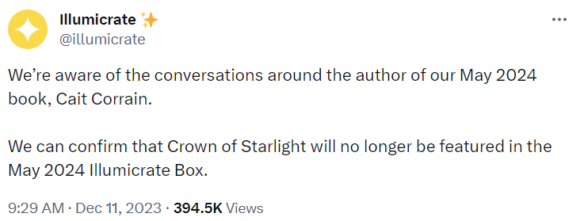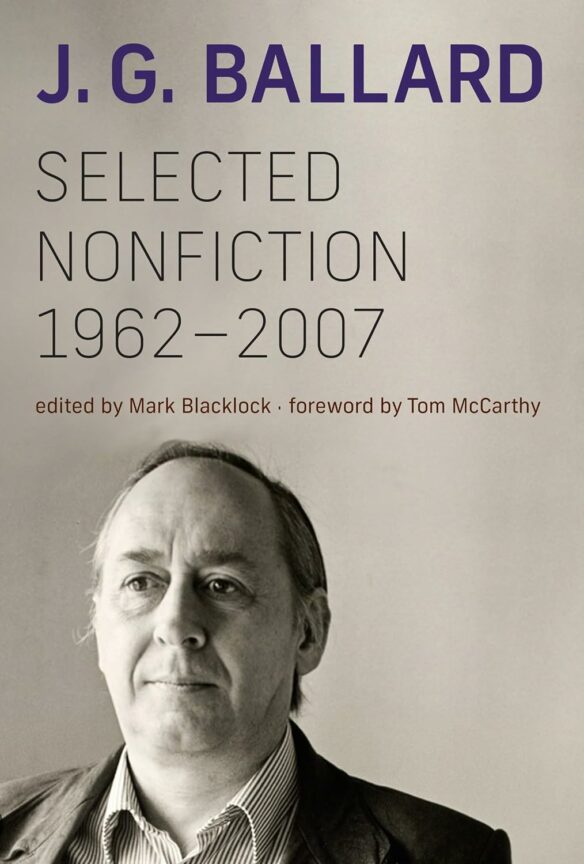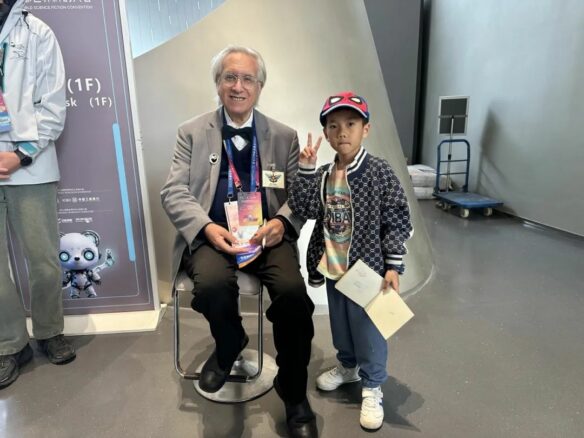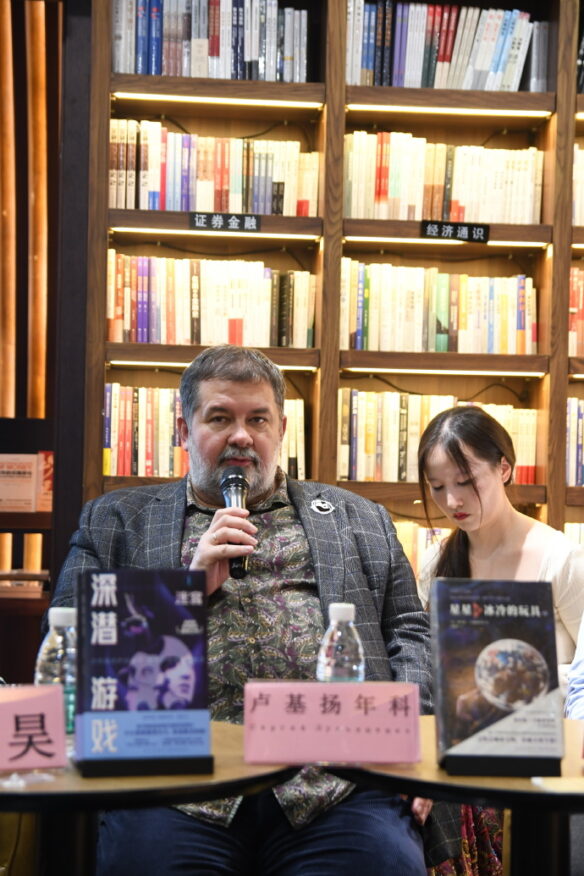(1) BOTTOM FALLS OUT OF THE CORRAIN MARKET. Cait Corrain, a debut author who was on Goodreads dropping one-star reviews on several others’ debut novels (see Pixel Scroll 12/7/23 item #1 and Pixel Scroll 12/8/23 item #4) has lost her agent, her publisher has pulled the book, and Ilumicrate has dropped her book from the upcoming crate.



The story even made NBC News today: “Author Cait Corrain loses book deal after accusations of review bombing on Goodreads”.
A first-time author has been dropped by her U.S. publisher and her agent after readers and fellow authors accused her of posting fake negative reviews to a popular book recommendation website.
Many within the book community last week appeared to publicly turn against Cait Corrain, the author of the coming sci-fi fantasy novel “Crown of Starlight,” after allegations surfaced that she made fake accounts on the Amazon-owned book review platform Goodreads to post negative user reviews online about fellow authors — a practice known as review-bombing….
(2) WORLDCONS AND HUMAN RIGHTS. Amazing Stories’ Steve Davidson has interviewed the writer of “Worldconned: How China Co-Opted Sci-Fi’s Crown Jewel Amidst the Uyghur Genocide”, recently linked in the Scroll: “Human Rights & Worldcon: An Interview with Danielle Ranucci of the Human Rights Foundation”.
ASM: In moving forward, do you think that WSFS and its members should be taking a host country’s politics and human rights into consideration when accepting bids for host countries?
D.R.: It’s essential for WSFS and its members to take a host country’s politics and human rights into consideration when accepting bids. There are many reasons for this. First, self-protection. How safe would it be for an attending member to publicly criticize China for its genocide at the 2023 Worldcon? For reference, when China hosted the 2022 Olympics, it warned Olympic athletes not to criticize the regime or they would face consequences. Given how China had handled protestors during the 2008 Beijing Olympics, the consequences for speaking out against the regime are all too evident: intimidation, arrests, and killings.
It would be downright perilous for anyone to criticize China while at Worldcon. Now, I doubt that state repression is a common conversation topic at Worldcon, but the extreme danger that members would face for even broaching this topic means that they are never truly secure. For every second they spend in a dictatorship like China, their safety is always jeopardized. Clearly, it is unconscionable to ignore a country’s human rights record and so jeopardize the safety of attending members in this way.
Considering human rights also helps protect Worldcon from being twisted into a tool of totalitarian repression. Hosting events like Worldcon helps dictatorships distract from, and legitimize, ongoing repression. I wrote about the effect such reputation-laundering has on outside countries, but it also has an important effect on those living within the dictatorship: It isolates them. Americans praise China’s futuristic-looking sci-fi museum while Chinese citizens can’t even find employment. Yet their lived experiences become invalidated. Their reality is made unimportant. And for people being persecuted by the regime, to diminish their suffering in this way is to forsake them. In a sense, it’s to render their pasts, presents, and futures meaningless….
(3) A CONFEDERATE HELICOPTER? An Alabama inventor tried to design a helicopter for military use during the Civil War. What could be steampunk-ier than that? “Helicopters During the Civil War? Almost” at Historynet.
…What if Confederates had invented a helicopter capable of dropping bombs?
It came closer to happening than many people realize. An innovative inventor in Alabama saw the potential for such an aircraft and actually drew up plans for how it might fly. Those drawings are preserved today in the archives of the National Air and Space Museum at the Smithsonian Institution in Washington, D.C.
By January 20, 1862, Union ships had managed to prevent most vessels from entering or leaving the major Confederate port of Mobile Bay. While certainly not a complete cordon, the blockade cut off delivery of supplies and, more important, the export of cotton to other nations—a much-needed source of income for the Southern war effort.
William C. Powers believed he had the answer to breaking the blockade: a motorized airship capable of bombing the Northern fleet. Known today as the Confederate helicopter, his idea offered a revolutionary look at solving a bothersome military problem….
…And to many historians as well. Powers’ plans and a small-scale model he built were donated by his family to the Smithsonian Institution in 1941. Since then, researchers and aeronautical engineers have pored over his design to determine the scope and feasibility of his idea….
(4) GETTING IT RIGHT AND GETTING IT WRONG. [Item by SF Concatenation’s Jonathan Cowie.] This weekend’s Infinite Monkey Cage on BBC Radio 4 looked at the depiction of space in SF film compared to reality.
Infinite Monkey Cage is a light-hearted look at science co-hosted by a comedian and a physicist (other sciences are available). This week they were accompanied by an Oscar winning SFX person and three astronauts.
There was much covered during the course of the show including how one aspect of space craft SFX they deliberately got wrong for Interstellar because it looked right. And in Gravity Sandra Bullock would not have worn those undies as nappies are the order of the day…You can listen to the 25-minute programme here.
Brian Cox and Robin Ince put Hollywood under the microscope to unpick the science fact versus science fiction of some of the biggest movies set in space. They are joined by a truly out of this world panel of space experts including astronauts Tim Peake, Nicole Stott and Susan Kilrain alongside Oscar winning Special FX director Paul Franklin, whose movies include Interstellar and First Man. Tim, Nicole and Susan fact check how space travel and astronauts are portrayed in movies such as Gravity and The Martian, whilst Brian and Robin argue about Robin’s lack of enthusiasm for Star Wars. They look back at some of the greatest Space movies including Alien and 2001 A Space Odyssey and ask whether some fictional aspects of these blockbusters may not be so far from our future reality?

(5) BLACKLOCK Q&A. The Arthur C. Clarke Award blog has a piece about “The Nonfiction of J.G. Ballard: An interview with editor Mark Blacklock” at Medium. Blacklock’s new book is The Selected Nonfiction of J. G. Ballard.
MARK: … Once it was all gathered, my first instinct was to include everything, but wiser counsel prevailed: it would have been unmanageable. I made sure to include anything significant that had been ignored for A User’s Guide or turned up since — the Introduction to the French Edition of Crash, for example, which I think he felt was not for a general audience; all the commentaries on his own work that had appeared in forewords and introductory glosses; and a sample of the reviews he wrote for Chemistry & Industry at the start of his career. I cut the number of book reviews that make up the majority of A User’s Guide too, in favour of showing a greater range of his work — the lists and glossaries, the “capsule commentaries.” The major decisions then were over which of the book reviews to include, because he was so prolific as a reviewer. I have about 30 of some 180. I printed them all off, read them several times and gave them all star ratings and then selected from the top-starred for a representative range across dates and publications. This felt like quite a heavy responsibility, but all the reviews are included in the bibliography so geeks like us can go and find those that aren’t in the book….

(6) CHENGDU WORLDCON COVERAGE CONTINUES. [Item by Ersatz Culture.] There have been several con reports and related news items since the last update in a Scroll; the following are a fairly arbitrary selection of recent and older items, with more to follow at some point.
Sylvia Hildr con report
This is a unique – I think – report, in that it’s written in English by a Chinese person. Given that this report isn’t subject to the vagaries of machine translation, I’ll just include a short extract here
Did I have a good time? Well, I met with fans and writers who share the same deep passion for science fiction and it was fascinating experiences. I learned of lots of sci-fi magazines and databases where organizers put their best efforts to make it easier for Chinese fans to open their eyes. I will always cherish these memories. But, the difficulties that these people had to overcome truly blew my mind. Not a single conversation could end without any reasonable complaints. I could not take the stance for them but as I checked WeChat groups and Moments, or talked with friends, the situation was the same.
Hugo finalist Yang Feng receives WSJ magazine award
On Saturday, Best Editor (Short Form) and Best Related Work Hugo finalist Yang Feng received an award from the Chinese edition of the Wall Street Journal magazine; relevant Weibo posts are here, here and here. I’m not sure exactly what relevance is of the guy with the shamisen-esque stringed instrument, but traditional music seems to have been a running theme of the awards ceremony.
I don’t think this is directly Worldcon/Hugo related, as the award seems to have been for business innovation, so it was possibly more due to her being CEO of the 8 Light Minutes publishing company?


Chengdu kids write about their Worldcon experiences
In early November, Character Weekly – which seems to be a magazine aimed at a young audience – published several short write-ups and photos (alternative link) from Chengdu children documenting their thoughts about attending the Worldcon. A couple of examples (via Google Translate, with manual edits):
I felt very honored to visit the World Science Fiction Convention that was held in Chengdu. In the science fiction museum, I communicated with an intelligent robot dog, walked through a fantasy universe, and saw various science fiction works that I had never heard of before. I was particularly fortunate to have a brief exchange, and to take a photo with, Mr. Ben Yalow, Chairman of the Worldcon. Through this event, I truly felt the infinite imagination of human beings and the charm of science fiction.
_________________
A few days ago, my mother and I participated in the 81st World Science Fiction Conference held in my hometown of Chengdu. In the Chengdu Science Fiction Museum, which is like a vast nebula, we experienced The Wandering Earth, Benben [the giant robot/vehicle structure], Kemeng [aka Kormo, the mascot), and the Hugo Awards with science fiction fans from all over the world, wonderful lectures by science fiction celebrities, etc., I also collected a book full of autographs, and took photos next to the beautiful Hugo Hall. This is the closest experience I have to science fiction, and I hope that one day I can do follow the same path, winning the Hugo Award for writing good science fiction works. I will meet the future with my scientific dreams.




Lukyanenko ends China tour
This Weibo post from his Chinese publisher covers the final event in Shanghai on Sunday 10th.

(7) TODAY’S BIRTHDAY.
[Written by Cat Eldridge.]
Born December 11, 1959 — M. Rickert, 64. Tonight’s Birthday is that of M. Rickert who I must say never disappoints me. I loved her writing ever since I read her very first short story nearly a quarter of a century ago, “The Girl Who Ate Butterflies”. It’s certainly a wonderful story.
I’d say that two-thirds of her nearly fifty pieces of short fiction were published in The Magazine of Fantasy & Science Fiction. Very impressive indeed. Some picked up well deserved awards— “Journey into the Kingdom” won a World Fantasy Award, and “The Corpse Painter’s Masterpiece” a Shirley Jackson Award. Many more were nominated for Awards.
There are three collections of her short fictions, both well worth your time on these cold nights. The first, Map of Dreams, covers a wide spread of her stories, and won a World Fantasy Award and the Crawford Award. The “Map of Dreams” novella herein was also nominated for a World Fantasy Award.
The second, Holiday, showing how prolific she is as a short fiction writer as it is filled with just stories from 2006 and 2007. You can find “Journey into the Kingdom” here.
The third, You Have Never Been Here: New and Selected Stories, to a certain extent is less necessary than the first two as a large part of it is already in the first two. If you’re a fan of hers, by all means pick it up.
Now her novels, her interesting novels. Both are very impressive with my favorite being The Memory Garden which sort of tangentially reminds me of McKillip’s The Solstice Wood in tone if not story. I’ll say The Shipbuilder of Bellfairie is one quirky novel. Really quirky novel. Not quite what to make of it.
Since this is the Christmas season, I should note her “Lucky Girl: How I Became a Horror Writer” is a Krampus story. It’s available as an actual paperback book or an epub.
(8) SPIRIT OF THE SEASON. Bobby Derie looks at what remains of Lovecraft’s Christmas verses to his correspondents: “Her Letters To Lovecraft: Christmas Greetings” at Deep Cuts in a Lovecraftian Vein.
H. P. Lovecraft spent most of his adult life in genteel poverty, slowly diminishing the modest inheritance that had come down to him from his parents and grandparents. He had no cash to spare on expensive gifts for his many friends and loved ones. So Lovecraft was generous with what he had—time, energy, and creativity. While not religious or given to mawkish displays, when it came to Christmas, Lovecraft poured his time and energies into writing small verses to his many correspondents, a body of poems collectively known as his “Christmas Greetings.”…
… In looking at Lovecraft’s Christmas Greetings to his women correspondents, we catch a glimpse at Lovecraft’s thoughtfulness. Their response, unfortunately, is often lost to us; though some few of them certainly responded in kind. We know Elizabeth Toldridge, for example, wrote her own Christmas poems to Lovecraft, because at least one survives….
(9) RAYMOND CHANDLER POEM REVEALED. Apparently located in the Bodleian, it may be a poetic response to the loss of his wife: “’A moment after death when the face is beautiful’: rare Raymond Chandler poem discovered by US editor”, a news item in the Guardian.
… Published on Monday in the 25th-anniversary issue of the Strand magazine, the poem, titled Requiem, dates back to 1955 and was discovered by the magazine’s managing editor, Andrew Gulli….
Grappling with loss, grief and what it describes as the “long innocence of love”, Requiem opens with: “There is a moment after death when the face is beautiful / When the soft, tired eyes are closed and the pain is over.”
For two stanzas, Requiem describes the moments after death when the “long innocence of love comes gently in / For a moment more, in quiet to hover”, as well as the fading of “bright clothes” and a “lost dream”. It adds that “silver bottles”, “three long hairs in a brush” and “fresh plump pillows / On which no head will lie/ Are all that is left of the long, wild dream”….
(10) MAKING A LIST AND CHECKING IT TWICE. “Big Bang observatory tops wish list for big US physics projects” reports Nature.
The United States should fund proposed projects to dramatically scale up its efforts in five areas of high-energy physics, an influential panel of scientists has concluded.
Topping the ranking is the Cosmic Microwave Background–Stage 4 project, or CMB-S4, which is envisioned as an array of 12 radio telescopes split between Chile’s Atacama Desert and the South Pole. It is designed to look for indirect evidence of physical processes in the instants after the Big Bang — processes that have been mostly speculative so far.
The other four priorities are experiments to study the elementary particles called neutrinos, both coming from space and made in the laboratory; the largest-ever dark-matter detector; and strong US participation in a future overseas particle collider to study the Higgs boson.
An ad hoc group called the Particle Physics Project Prioritization Panel (P5) presented the recommendations on 7 December. The committee, which is convened roughly once a decade, was charged to make recommendations for the two main US agencies that fund research in high-energy physics, the Department of Energy (DoE) and the National Science Foundation (NSF)….
(11) VIDEO OF THE DAY. Mark me as one of Today’s 10,000. I just learned there’s a Roblox game based on the Hamilton musical. “Hamilton X Roblox”.
Enhanced battle, squad upgrades, and a new rebirth mode to keep the adventure going. Check out the newest Hamilton Roblox update now!
[Thanks to Cat Eldridge, SF Concatenation’s Jonathan Cowie, Mike Kennedy, Bruce D. Arthurs, Anne Marble, Steven French, Ersatz Culture, Andrew Porter, John King Tarpinian, and Chris Barkley for some of these stories. Title credit belongs to File 770 contributing editor of the day Cubist.]
